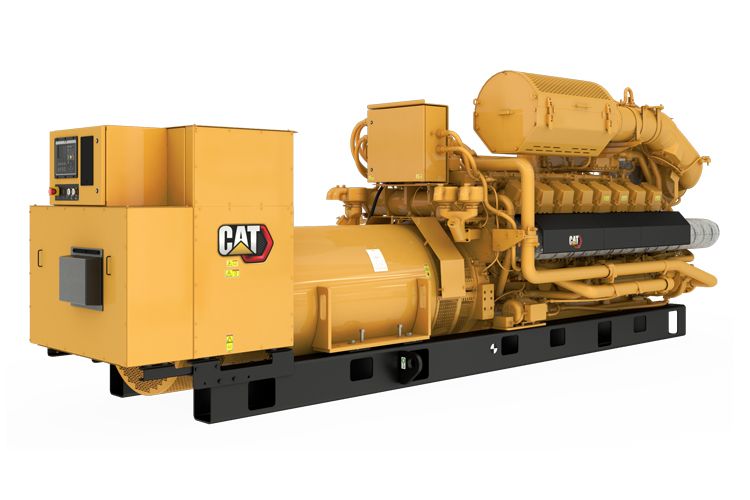Customer: University of Maryland Upper Chesapeake Medical Center (UM UCMC)
Location: Bel Air, Maryland, USA
Customer Business Issue: Emergency power for medical center
Solution:
Cat® Dealer: Alban Power Systems

UM UCMC is a not-for-profit healthcare provider dedicated to improving community health services in Bel Air, Maryland. The 44-acre hospital employs nearly 650 physicians in 83 specialties including behavioral health, breast cancer, cardiology, intensive care, pediatric emergencies, reconstructive surgery and sports medicine, among others.
It’s common for hospitals to expand over time, and facility managers are finding that existing backup generators can no longer support power needs during outage situations. Every medical facility faces a unique set of challenges to ensure continuous patient care and UM UCMC was no different. The existing backup generator set could only handle about 40 percent of healthcare-specific loads during emergency situations, including cooling needs.
“As we’ve seen with Hurricane Katrina and more recently Hurricane Sandy, it is not good for hospitals to be without cooling during a summertime utility emergency,” said Don Allik, director of facilities at UM UCMC. “Therefore, we started exploring ways to provide more power to the campus, and one of the things that struck us was utilizing a cogeneration gas engine and combining it with our backup diesel engine to provide power to the campus in an emergency.”
Combined head and power (CHP) is one of the most cost-effective solutions for particularly thin margins. The total energy cost savings can more than offset the total owning and operating costs of such systems.
“Having another source of power besides the diesel and a source of power that saves money through its operation is certainly a win-win in anybody’s book,” Allik added. UM UCMC signed a Power Purchase Agreement (PPA) with Clark Energy and Structured Finance
Group that is estimated to save the hospital $9 million thanks to the electricity price and waste heat utilization. The project also received $1.5 million in funding from local utility BG&E as part of the EmPower Maryland CHP incentive awards program.
However, before the CHP system could be utilized fully, hospital officials needed a reliable backup power solution to increase redundancy and provide enough power during an outage.
UM UCMC worked with local Cat dealer Alban Power Systems to install a new Cat G3516H natural gas-fired generator set for 2 MW of power, instead of using two smaller engines to run parallel with the utility. The G3516H is a great fit because it can simultaneously provide electricity for electrical loads and heat energy for a facility’s thermal requirements.
“We took a hard look at it, and we thought this could be a very good application for this project,” said Theo Milford, the Clark PE and project manager. “One of the things that stood out was having a high-efficiency generator set that could meet emissions reduction levels. Another deciding factor was procuring a larger engine and having the ability to run it at a lower set point and maintain power production, as well as thermal output.”
When combined with the existing diesel generator, the system can power 65 percent of campus loads and 90 percent of healthcare occupancy loads. While it operates at about 60 percent of its capacity, the G3516H can crank up to full power during an outage to help meet energy needs at UM UCMC.
Beyond power, the CHP system utilizes waste heat to produce steam in a heat recovery steam generator. The system also creates hot water and directs steam into absorption chillers to create cool water for air conditioning. These byproducts of a CHP system make it more efficient than traditional energy systems.
“One of the advantages of cogeneration is that it’s considered a very green methodology for producing power,” Allik said. “Operating our CHP unit is equivalent to taking 2,200 cars off the road permanently. And cogeneration at the hospital runs at about 65 percent efficiency, whereas the efficiency of the power derived from the utility runs at 35 to 40 percent.”
When it came time to perform emissions testing on the new CHP system, an Alban technician made modifications in the field to ensure that Clark had no issues at all with the engine operation.
Alban also continues to support UM UCMC with parts, training and maintenance services as needed.
“Alban was able to resolve any issues that we faced,” Milford said. “We had a very good experience – especially on the service side – where we previously had very good experiences with the team at Alban on the engineering and development sides.”
From natural gas to biogas, coal mine gases, or hydrogen fuel blends to support combined heat and power (CHP), emergency power, and local grid support applications, Caterpillar has a wide range of reliable gas power solutions.
Learn More




